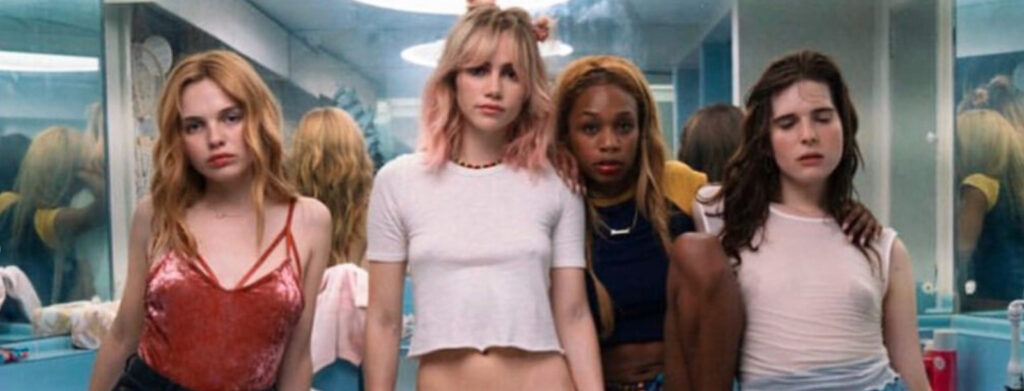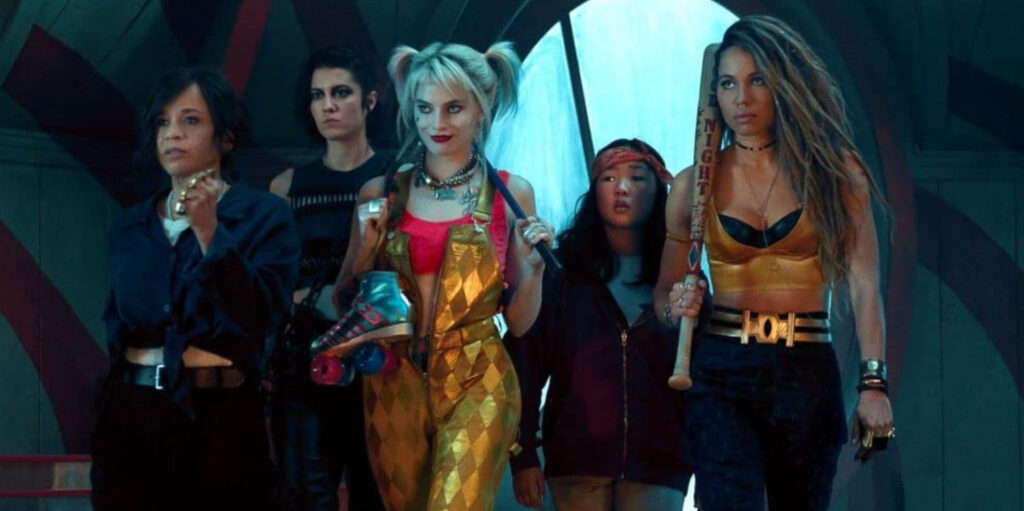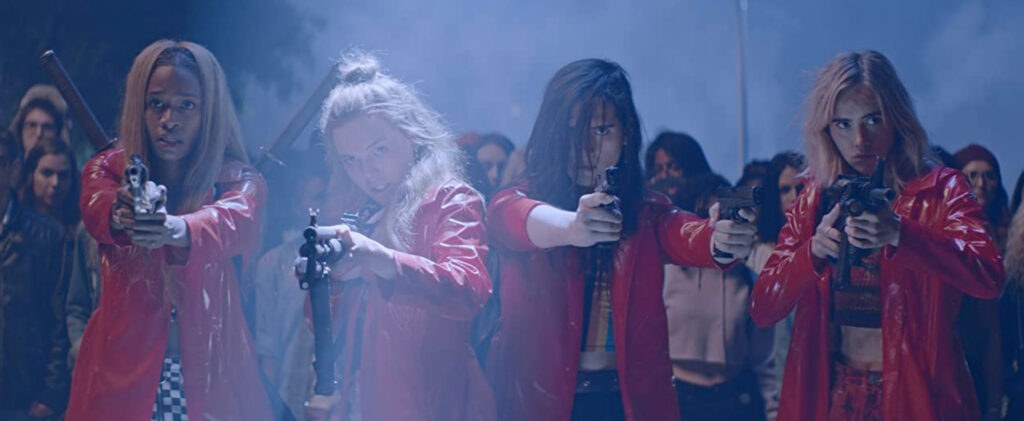The Validation Game: Objectification in Birds of Prey and Assassination Nation

It’s the dawn of a new cultural era and feminist cinema is on the rise! Two prime examples are 2018’s Assassination Nation and 2020’s Birds of Prey: And the Fantabulous Emancipation of One Harley Quinn. While I absolutely loved every second of both, I know many men who don’t like either. Birds of Prey suffered a disappointing (by industry standards) opening weekend at the box office and Assassination Nation seemed to open and disappear almost overnight. Given the message of both films, maybe this shouldn’t be surprising. The connective tissue is that women don’t need male validation. We don’t need men to like us and the approval we seek often destroys us. While Birds of Prey celebrates this emancipation, Assassination Nation shows us why it’s necessary.
But first, a quick caveat: Feminism is often misunderstood as women wanting to take over, but true feminism is advocacy for women’s rights based on gender equality, not female superiority. It’s good for all of us. By emancipating women from this objectification and subservience, men can free themselves too. Win win, right?
The patriarchy is a system of gender-based oppression seeking to model society after a male-centric family structure with women in the supporting role. Girls are taught from a young age that this is how to find safety in a male dominated world. Whether fathers, boyfriends, or husbands, we need a man to protect us in order to survive. And we must find that man by making ourselves as appealing as possible. But both Assassination Nation and Birds of Prey drive a truck through the heart of this toxic lie. We do not need men. We are capable of not just surviving, but thriving in an unpredictable world. In fact, by learning to navigate the whims and desires of men, we’ve been training for it our whole lives.
Female appearance is a fundamental element of the game. By making ourselves physically appealing to those we seek approval from, we gain social capital when we are accepted. But what we’re told to be is complicated. Assassination Nation’s Lily (Odessa Young) lists many of these demands, “be confident, be interesting, don’t be so difficult, be strong, don’t fight back, be an angel, be a whore, be a princess.” We’re expected to navigate these expectations and more to gain status and security.

Both films confront this idea with the styling of their female and femme characters. While Assassination Nation comments on how women objectify themselves (Lily has an extensive monologue about the process of getting a selfie just right), Birds of Prey let’s its women dress however they want. A recent (and infuriating) tweet made the rounds by suggesting that the film would bomb due to a lack of sexy character design, specifically mentioning Mary Elizabeth Winstead as the Huntress. Many women chimed in to say that of course her character is dressed sexily, but I can understand the confusion. It’s not that the women aren’t sexy, it’s that they aren’t objectified. There are no gratuitous cleavage shots or slow pans up a character’s legs. And while some are dressed scantily, it’s never really commented on. Harley mentions fashion that is functional (hair ties and bulletproof bustiers) but there is no shame to be found. Even when Detective Montoya (Rosie Perez) chooses to wear a shirt mentioning shaved balls over garbage covered clothing, she maintains her professionalism.
The women of Assassination Nation are argueably objectified, but mostly in the form of selfies and phone videos suggesting they are the ones in control of the camera. We do see the nudes Lily sends, but we don’t linger on them and they are presented as a source of shame. We see the objectification from the inside and we understand how it feels.
The exception is Reagan (Bella Thorne). She performs a sexy dance in a cheerleader’s uniform that the camera indulges from many angles. But this is after she delivers a rather vapid monologue about inspiring people with her insta that even her friends find ridiculous. She is the only cheerleader dancing in this way, putting her in sharp contrast with the other members of her squad. She’s also taken part in the objectification, playing the game by leaking her best friend’s nudes and thus maintaining the patriarchal system of oppression to secure her place in it.
So we learn to play the game and we cross our fingers. Because it can turn on a dime. By being what men have told us they want, we become a living reflection of their desires. When those desires are not socially acceptable, we become a threat to the person who asked for them. A fight with Lily’s boyfriend, Mark (Bill Skarsgard) harshly shows this dichotomy. We hear Lily’s voice describing how Mark made her feel beautiful when they first started dating, but this runs throughout a scene in which he berates her for dressing like a slut. The moment she challenges his ego, he shames her for being the very thing he’d told her he wanted.
Lily’s leaked nudes become an embarrassment for Mark but a dangerous liability for her.
Because she is viewed as the sexual “property” of her boyfriend, those photos (sent to another man) challenge his claim on her. Mark records himself assaulting her as punishment that makes her the target of a violent mob. In Birds of Prey, we see Roman Sionis (Ewan McGregor) punish a woman in this way as well. For daring to laugh at the wrong time, he forces her to tearfully dance on a table while her dress is cut off. It’s chilling and reveals that, like Mark, he values his own ego above her body and soul.
Let us also note that many women support the patriarchy as well. Lily’s mother is shocked to see a different side of her “little girl.” Rather than a troubled child, Lily becomes a source of shame for the family; a commentary on her parenting. Because her mother is more concerned with maintaining her image, she throws her daughter away, literally dragging her into the street. Harley is similarly betrayed by Doc who chooses money for a new restaurant over her safety.

As we begin to master the game, we simultaneously learn that it will inevitably destroy us. We will lose our humanity and become plot devices in the narratives men write about themselves. The only options are to maintain the toxic system and sell out other women, or to stop playing altogether. To follow our own desires. We can never be exactly what society demands because we are humans not products. We say fuck it. We don’t need you to like us.
Except of course we do. We’ve been conditioned to design everything about ourselves to appeal to the men who give us validation. We’ve been told since birth that this is our ultimate goal and that our safety demands we achieve it at all costs. But we are the ones who end up paying. By selling ourselves for stability, we become property. And then we become an object to covet. Which means another man will want us. And men who see us as property will always sell us out at some point.
You’re probably reading this and thinking that I hate men, but I do not. For every man reveling in his male gaze, there is another refusing to play. These are the men we need in this fight because unfortunately, the kind of minds we need to change don’t listen to women. We need male co-conspirators to show them that when they change how they view us, they can change how they view themselves. The weight of an entire gender’s dependency is heavy. So maybe the emancipation of Harley can be more than just for women. Maybe by saying we don’t need men to like us, we can say to men, we don’t need you to tell us who to be anymore. We don’t need your protection anymore so you can stop feeling responsible for us. You no longer have to define yourself by your ability to protect us. You can be free too. Free to be who you actually are without the stress of navigating your role in the patriarchy. We can all be free. Win win.